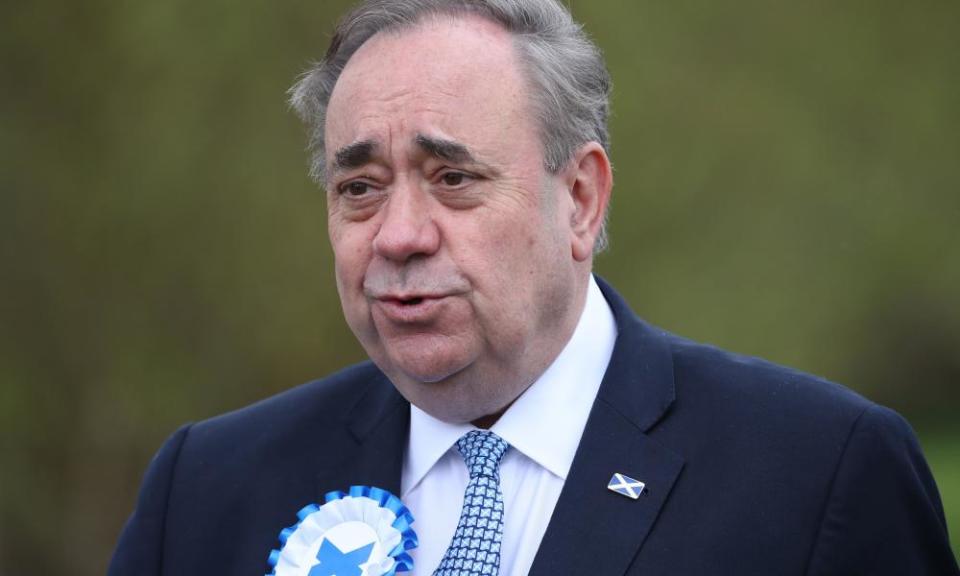Scotland’s rejection of Salmond illustrates nationalist shift

As Alex Salmond joined a group of mainly male, middle-aged Alba supporters on a YouTube podcast on Saturday afternoon to denounce the “weirdos and cranks” in the media and the “graceless” SNP leadership, the regional list results for the 2021 Scottish parliament elections were coming through at pace.
As the former first minister’s newly formed party failed to gain a single seat, the face of Holyrood was changing: here was the first woman of colour elected as an MSP, Kaukab Stewart for the SNP, then the second, the Scottish Conservatives’ Pam Gosal, and now the first permanent wheelchair user, Labour’s Pam Duncan-Glancy.
By the end of the day, Holyrood could boast its most diverse parliament, with 45% of seats held by women, a tripling of members of colour to six, and many more first-timers in post.
Equality campaigners would point out that this has been a long time coming – the Welsh assembly, as it then was, became the first legislature in the world to have an equal number of male and female members nearly 20 years ago – and that there is much progress still to be made: there has never been a black MSP, Duncan-Glancy struggled to gain access to her own election count, and three female MSPs quit at the end of the last term on the grounds that they were unable to balance their jobs with a young family.
Nicola McEwan, co-director of Edinburgh University’s Centre for Constitutional Change, identifies a “freshness and vibrancy” to the new cohort “which didn’t happen by accident”, she adds, pointing to efforts by the SNP, Greens and Labour to diversify their candidates.
Watch: Alex Salmond - Alba’s election performance was ‘creditable’
In terms of how this spills over into the wider independence movement, she notes that “the gender gap is now moving in the opposite direction to 2014, with women more inclined to support independence than men, although that it still not as pronounced as the age gap, which remains most apparent in the over-65s”. Younger people are far more likely to support independence.
“The dynamics in the new parliament will be very different,” Stewart told the Guardian, on Sunday. “While the distribution of seats to parties hasn’t changed much, the people have and they will have different approaches, different life experiences and stories. When you have those voices present at the beginning of drafting legislation it’s inevitable that policy will be shaped differently.”
Voters’ rejection of Salmond himself, who failed to gain sufficient votes in the north-east region he had represented in two parliaments for three decades, is illustrative of more gradual changes in the independence movement, prompted by an influx of often younger, greener, more socially liberal supporters around the first referendum, then the feminising leadership of Nicola Sturgeon, and the impact of Salmond’s own trial, which saw him acquitted of 14 charges of sexual assault last March, and the subsequent inquiries into the Scottish government’s handling of sexual harassment complaints against him.
Many younger activists view Salmond as a historical figure while others were deeply perturbed by his seemingly unapologetic behaviour and insistence on thrusting himself back into the political spotlight after inquiries that, for them, raised as many questions as were answered about his conduct towards younger female staff. His public approval ratings are now lower than those of Boris Johnson in Scotland.
While Alba’s campaign made manifest some deep fissures in the independence movement and the SNP – around referendum strategy, centralisation and reform of transgender rights – there is cautious optimism that an influx of fresh energy and ideas at Holyrood can address those challenges from a less entrenched position. Many internal critics have already defected to Alba during the campaign.
Later on Saturday, Salmond insisted that “in only six weeks Alba has established itself as a political force with which to be reckoned” and would continue to build its support in order to contest local elections next year.
But with no representation in Holyrood it is much more difficult for Salmond to maintain his disruptive influence; he is a thorn without a side.
Watch: How to save money on a low income

 Yahoo Finance
Yahoo Finance 